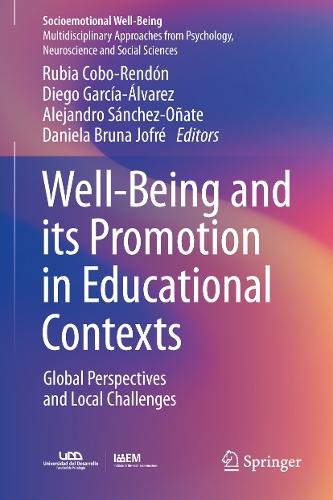Overview
This book provides a comprehensive examination of well-being in educational contexts, focusing on the promotion of well-being across diverse educational settings. It examines how well-being develops, is promoted by various factors, and is strengthened throughout different life stages, including the well-being of educators. The book's unique emphasis explores how well-being interventions can be adapted to diverse cultural and socioeconomic realities. Through an approach that integrates theories and empirical evidence, it presents an in-depth analysis of how well-being can be promoted in different educational scenarios and cultural contexts. The book is structured in six parts. Part I introduces the concept of well-being in educational settings, providing a foundational framework and exploring its relevance as both a right and a driver of inclusive and sustainable development. Part II focuses on well-being during early and primary education, highlighting the importance of interpersonal relationships, emotional development, and early interventions to strengthen cognitive and socioemotional skills. Part III focuses on adolescence, examining the critical role of schools in shaping youth well-being, with an emphasis on peer relationships, multiculturalism, resilience, and positive psychological development. Part IV addresses well-being in higher education, exploring mental health, student retention, academic engagement, socioemotional interventions, and the use of character strengths as predictors of flourishing. Part V shifts the focus to educators, discussing the well-being of teachers and school staff, their emotional experiences, and institutional conditions. Finally, Part VI presents concluding reflections on well-being as a transformative foundation for education across all levels and roles. Well-Being and its Promotion in Educational Contexts: Global Perspectives and Local Challenges will be of interest to both researchers and professionals interested in studying and implementing strategies to promote well-being in educational settings, such as school, educational and developmental psychologists, as well as schoolteachers and school administrators, academic researchers and policy makers.
Full Product Details
Author: Rubia Cobo-Rendón ,
Diego García-Álvarez ,
Alejandro Sánchez-Oñate ,
Daniela Bruna Jofré
Publisher: Springer Nature Switzerland AG
Imprint: Springer Nature Switzerland AG
ISBN: 9783032000248
ISBN 10: 3032000246
Pages: 669
Publication Date: 09 November 2025
Audience:
Professional and scholarly
,
Professional & Vocational
Format: Hardback
Publisher's Status: Forthcoming
Availability: Not yet available

This item is yet to be released. You can pre-order this item and we will dispatch it to you upon its release.
Author Information
Rubia Cobo-Rendón is a psychologist and holds a PhD in Psychology from the University of Concepción (Chile), with postgraduate training in clinical psychology, child and adolescent psychology, and higher education teaching from Universidad Rafael Urdaneta and Universidad Pedagógica Experimental Libertador (Venezuela). Currently pursuing a postdoctoral fellowship in artificial intelligence and education at the University of Guadalajara (Mexico). She is a professor at the Faculty of Psychology at Universidad del Desarrollo and a researcher at the Instituto de Bienestar Socioemocional (IBEM). She is an active member of both the School Coexistence Laboratory and The Multilevel Learning in Higher Education (AMES), where she leads the research line “Determinants of Well-Being Associated with Success in Higher Education.” She currently serves as principal investigator on several applied research projects funded by both external and internal grants. With more than 60 indexed scientific publications, her academic work focuses on positive psychology, well-being, self-regulated learning, motivational climate, the use of technology in education, and cognitive-motivational variables that influence student retention and adjustment to university life. Diego García-Álvarez is a psychologist, educator, and accredited scientific researcher recognized by multiple organizations, including the National System of Researchers at the National Agency for Research and Innovation of Uruguay. He holds a PhD in Educational Sciences and has completed postdoctoral research in both Educational Sciences and, more recently, Behavioral and Health Sciences. With extensive experience teaching at universities and adult education programs throughout Latin America, Diego is a full professor at Universidad Metropolitana in Caracas, Venezuela, and an associate researcher at the Center for Psychology Studies at Universidad de Montevideo, Uruguay. His primary research focuses on the psychology of well-being, health, and optimal human functioning. He brings a rigorous scientific approach and editorial expertise to every project, ensuring the highest standards of quality and integrity in academic publishing. Alejandro Sánchez Oñate is a researcher at the Instituto de Bienestar Socioemocional (IBEM) and director of the Master’s degree in Educational Psychology at Universidad del Desarrollo, Chile. He holds a Master’s degree in Social Research and Development and a PhD in Psychology from Universidad de Concepción. He has served as the principal investigator and methodological advisor on various research projects in educational psychology, sociology of education, nursing, and educational sciences. His research focuses on social cohesion processes and their links with wellbeing in school education, with publications in theoretical, instrumental, and empirical studies, with a particular interest in mixed methods of research. Daniela Bruna Jofré is a psychologist from Universidad del Desarrollo and holds a PhD in Psychology from Universidad de Concepción. Her academic career has developed primarily at Universidad del Desarrollo, where she currently leads the Multilevel Learning in Higher Education Laboratory (AMES) and actively participates in undergraduate and graduate teaching. Her research focuses on self-regulated learning in higher education, the teaching practices that foster it, and the development of authentic assessment systems. She has led and collaborated on various projects funded by ANID and institutional grants, and her work has been published in high-impact indexed journals, highlighting her contribution to strengthening university teaching from an empirical and applied perspective. Her work is distinguished by its articulation of scientific evidence with pedagogical innovation, contributing to the transformation of educational practices.



